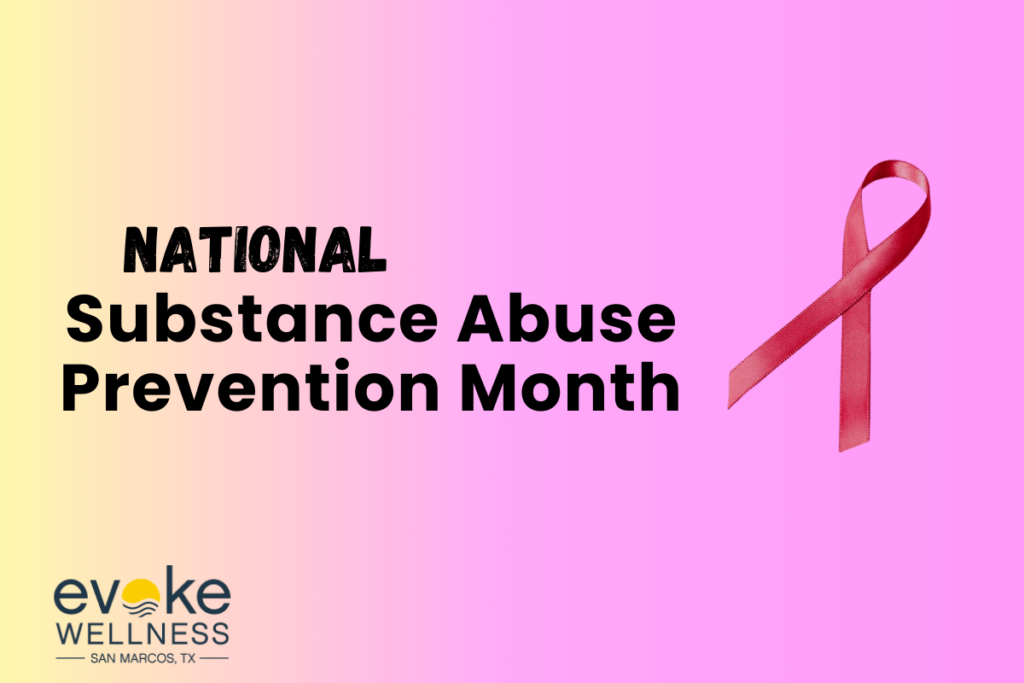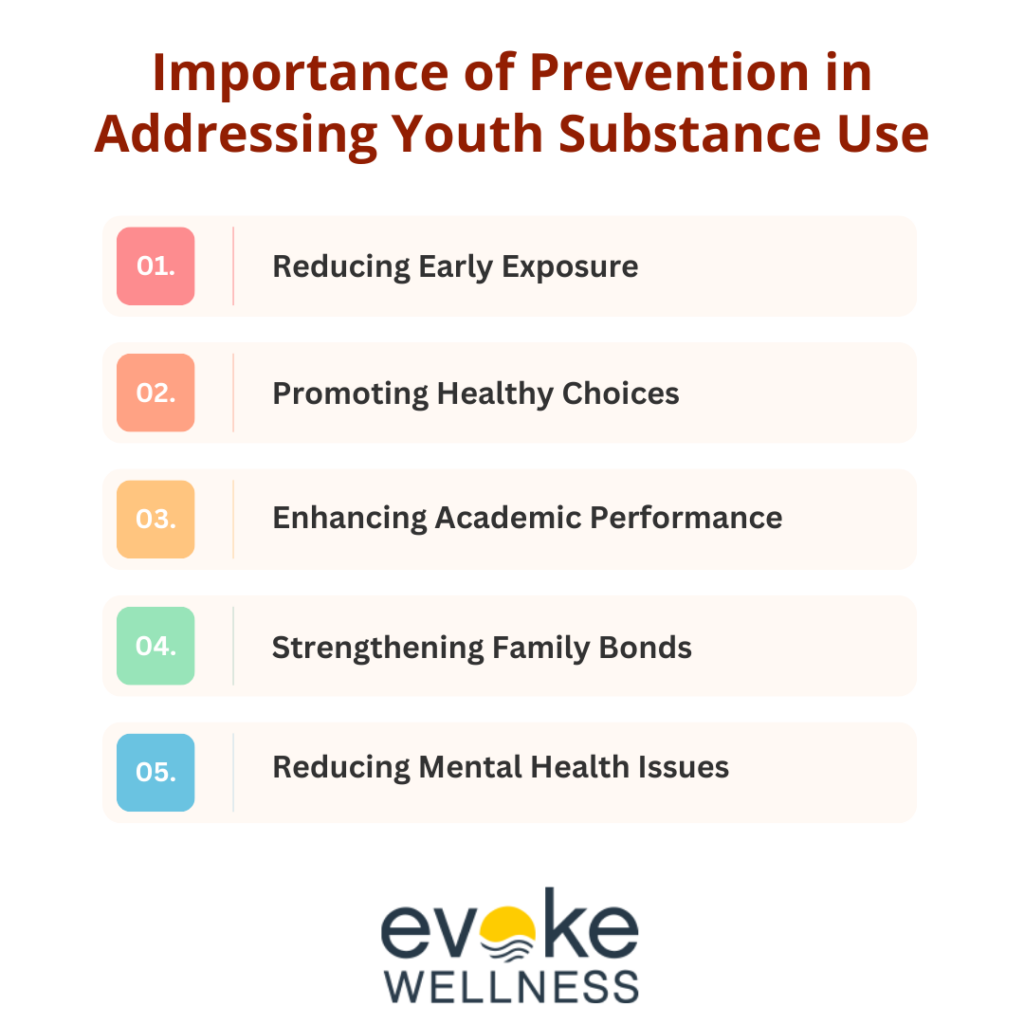October marks Youth Substance Use Prevention Month, a vital time to focus on the growing concern of substance use among young people and the importance of prevention strategies. At Evoke Wellness at San Marcos, we recognize that early intervention, education, and supportive environments are crucial in helping youth make informed choices that lead to healthier, substance-free lives. This month, we highlight the significance of awareness, resources, and support systems in combating substance abuse among young individuals.
Together, let’s embrace the journey to recovery and the promise of a new beginning. Call us at (833) 503-0734 today or reach out online.
Understanding the Risks of Youth Substance Use
The teenage years are a critical period for brain development and identity formation. Unfortunately, this is also a time when many young people are exposed to drugs and alcohol. According to the National Institute on Drug Abuse (NIDA), about 60% of high school seniors have tried alcohol, and 23% have used marijuana. These alarming statistics indicate a significant need for intervention. Substance use among adolescents can lead to serious health consequences, including:
1. Increased Risk of Addiction
Research shows that the earlier a person begins using drugs or alcohol, the more likely they are to develop an addiction later in life. The adolescent brain is still developing, making it particularly vulnerable to the effects of substances. Engaging in substance use during this formative period can alter brain development and increase the likelihood of addiction.
2. Mental Health Disorders
Substance use is often linked with mental health issues such as anxiety, depression, and post-traumatic stress disorder (PTSD). Young people who struggle with these disorders may turn to substances as a coping mechanism, which can exacerbate their mental health challenges and create a vicious cycle that is difficult to break.
3. Academic Challenges
Substance abuse can negatively impact academic performance, leading to decreased focus, lower grades, and increased absenteeism. Research shows that students who engage in substance use are more likely to drop out of school, limiting their future opportunities.
4. Legal Issues
Engaging in substance use can lead to legal problems, including arrests and criminal charges that may have lasting effects on a young person’s future. A criminal record can hinder educational and employment opportunities, further complicating recovery.
The Importance of Prevention
Prevention is a shared responsibility involving parents, educators, community organizations, and healthcare providers. By creating an environment that promotes healthy behaviors and open communication, we can help young people navigate the challenges they face. Here are some effective prevention strategies:
1. Education and Awareness
Education plays a crucial role in prevention. Teaching young people about the dangers of substance use, the risks associated with addiction, and the effects on mental health can empower them to make informed decisions. Schools and community organizations can host workshops and informational sessions that highlight the importance of healthy choices.
- School Programs: Many schools implement evidence-based prevention programs, such as the Life Skills Training Program and the Social Norms Approach, which have shown effectiveness in reducing substance use among youth.
- Community Campaigns: Communities can organize awareness campaigns that provide information on substance use, resources for families, and opportunities for youth engagement.
2. Promoting Healthy Activities
Encouraging participation in sports, arts, and other extracurricular activities provides young people with a constructive outlet for their energy. Engaging in positive activities can help reduce the likelihood of substance use by fostering a sense of belonging and purpose.
- Youth Centers: Establishing community centers that offer after-school programs and recreational activities can help keep youth engaged and provide them with safe spaces to socialize.
- Skill-Building Workshops: Programs focused on life skills, such as decision-making, stress management, and conflict resolution, equip young people with tools to navigate challenges without turning to substances.
3. Open Communication
Creating a safe space for young people to discuss their feelings, pressures, and experiences can significantly reduce the stigma surrounding substance use. Parents and guardians should strive to maintain open lines of communication, ensuring that their children feel comfortable discussing any issues they may face.
- Family Meetings: Regular family discussions about values, expectations, and the importance of avoiding substances can foster open communication and trust.
- Active Listening: Parents should practice active listening techniques, allowing their children to express themselves without judgment and providing guidance when necessary.
4. Peer Support Programs
Peer-led initiatives can be particularly effective in prevention efforts. Programs that empower youth to support each other, share experiences, and advocate for healthy choices can foster resilience and reduce the allure of substance use.
- Peer Mentorship: Older teens can mentor younger peers, sharing their experiences and helping them navigate challenges related to substance use and mental health.
- Support Groups: Establishing peer-led support groups can create a sense of community among young people, providing them with a platform to share their experiences and seek help.
The Role of Technology in Prevention
1. Digital Resources
The rise of technology offers unique opportunities to enhance substance use prevention efforts. Many organizations are leveraging digital platforms to provide education, resources, and support for youth.
- Online Education: Websites, webinars, and social media can be powerful tools for spreading awareness about the risks of substance use and sharing prevention strategies. Online courses can equip youth with knowledge about addiction and healthy decision-making.
- Mobile Apps: There are various mobile applications designed to educate young people about substance use and promote healthy habits. These apps often include interactive features that engage users and provide them with valuable information.
2. Social Media Campaigns
Social media platforms can serve as effective channels for prevention messaging. Campaigns that promote healthy lifestyles and share stories of recovery can resonate with young audiences and encourage them to make positive choices.
- Influencer Partnerships: Collaborating with influencers who advocate for healthy living can help reach a wider audience. These individuals can share personal stories and promote substance-free activities to inspire young people.
- Virtual Support Groups: Online platforms can facilitate virtual support groups where young people can connect and share experiences related to substance use. This creates a safe space for discussions and encourages peer support.
Evoke Wellness: A Resource for Youth and Families
At Evoke Wellness at San Marcos, we are committed to supporting individuals and families affected by substance use. Our Substance Abuse Treatment Programs are designed to provide comprehensive care tailored to the unique needs of each individual. Our offerings include:
- Cognitive-Behavioral Therapy Program: This evidence-based approach helps individuals identify and change negative thought patterns that contribute to substance use. Through CBT, clients learn coping strategies to manage stress and triggers effectively.
- Dialectical Behavior Therapy Program: This therapy combines cognitive-behavioral techniques with mindfulness strategies to help individuals manage emotions and cope with stressors. DBT is particularly effective for those struggling with intense emotions and interpersonal issues.
- Dual Diagnosis Treatment Program: For individuals struggling with both substance use and mental health disorders, our dual diagnosis program addresses both issues concurrently. This integrated approach ensures comprehensive care for clients facing complex challenges.
- Family Therapy Program: Engaging family members in the recovery process helps rebuild relationships and support systems crucial for long-term success. Family therapy sessions focus on improving communication, understanding addiction, and fostering a supportive environment.
- Group Therapy Program: Group therapy fosters community and connection, allowing individuals to share experiences and support one another in a safe environment. This shared experience can be incredibly empowering and therapeutic.
Conclusion
As we observe Youth Substance Use Prevention Month this October, let us commit to making a difference in the lives of young people. By fostering awareness, education, and support, we can help guide them toward healthier futures free from the burden of substance abuse. If you or a loved one is struggling with substance use or is seeking resources for prevention, contact us at Evoke Wellness at San Marcos. Together, we can create a brighter tomorrow for our youth. Your proactive steps today can lead to a healthier, substance-free tomorrow for our young generation. Call us at (833) 503-0734 today or reach out online.
FAQ on Youth Substance Use Prevention Month
What is Youth Substance Use Prevention Month?
Youth Substance Use Prevention Month is observed in October to raise awareness about the risks of substance use among young people and to promote effective prevention strategies.
Why is prevention important for youth?
Preventing substance use among youth is crucial because early exposure increases the risk of addiction and can lead to long-term mental health issues, academic challenges, and legal problems.
What are some effective prevention strategies?
Effective prevention strategies include education and awareness programs, promoting healthy activities, fostering open communication, and establishing peer support systems.
How can families support prevention efforts?
Families can support prevention efforts by maintaining open lines of communication, engaging in regular discussions about substance use, and encouraging participation in positive extracurricular activities.
What resources does Evoke Wellness offer for youth and families?
Evoke Wellness provides a variety of programs, including cognitive-behavioral therapy, dialectical behavior therapy, family therapy, and group therapy to support individuals and families affected by substance use.



